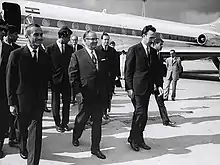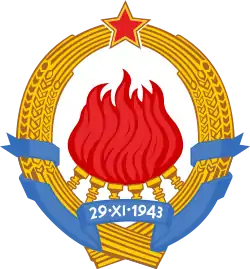Algeria–Yugoslavia relations
Algeria–Yugoslavia relations were historical foreign relations between Algeria and now split-up Socialist Federal Republic of Yugoslavia. Both countries self-identified with the wider Mediterranean region and shared membership in the Non-Aligned Movement. During the Algerian War Yugoslavia provided significant logistical and diplomatic support to the Algerian side which affected its intra-European relations with France. Within the Non-Aligned Movement Yugoslavia closely collaborated with self-described core members of India and Egypt while Algeria followed self-described progressive group in which Cuba played prominent role. Yugoslavia officially recognized the independence of Algeria on 5 September 1961 as the first country in Europe to do so.[1] This led to rupture in Yugoslav-French relations as Paris decided to withdraw its ambassador from Belgrade.[2]
Algeria |
Yugoslavia |
|---|---|


History

During the Algerian War representatives of the National Liberation Front described their Mediterranean ally Yugoslavia as their closest non-Arab allies.[2] During the war Yugoslavia de facto recognition of the FLN as the representative of the Algerian nation, but considering France's stern warnings avoided de jure recognition of the movement.[2] It is believed that the first secret contacts were established in 1954 in Cairo when Yugoslavia officially sold military equipment to Egypt which after one month were transferred to Algeria.[3] In October 1956 Belgrade hosted the meeting between FLN's Mohamed Khider and SFIO's Pierre Herbaut, while from 1957 Yugoslavia abandoned intermediation efforts and decided to openly support Algeria.[3] From that time French Navy started to interspect Yugoslav trade ships in Mediterranean believig that they deliver aid to Algerian rebels.[3] On 7 August 1957 French Navy discovered and took 70 tones of military equipment of Yugoslav ship Srbija [Engish: Serbia] while the largest discovered delivery was discovered on 18 January 1958 close to Oran when Jadrolinija's ship Slovenija [English: Slovenia] was found in possession of 148 tons of military equipment.[3] President of the Provisional Government of the Algerian Republic Ferhat Abbas visited Belgrade between 6 and 12 January 1959 where he talked with the President of Yugoslavia Josip Broz Tito.[1] On 2 February 1959 other two members Krim Belkacem and Mhamed Yazid held talks with the Ambasador of Yugoslavia to Tunisia.[1] Yugoslavia provided food, medicine, and military supplies to the Algerian fighters which Algerians did not expect from a middle-sized European communist country.[2] Yugoslav population perceived Algerian experiences as reminiscent of its not so distant National Liberation and Revolution during the World War II.[3] Country therefore paid attention to the cultural aspect of the Algerian War and sent its photographers such as Stevan Labudović who recorded 27 films and 274 photos in 1959-1962 period, official El Moudjahid newspapers were issued in Belgrade edition as well the first gramophone recording of the Kassaman.[3] On 1 Mart 1960 National Liberation Front (FLN) opened its Bureau in Belgrade.[1] Against the Indian wishes but with support of Sukarno and Nkrumah, the Algerian FLN was invited to attend the 1961 Non-Aligned Conference in Belgrade under the status of a sovereign government.[2] Ben Bella visited Yugoslavia in March 1964.[2]
List of bilateral state visits
Yugoslav visits to Algeria
Algerian visits to Yugoslavia
- 9 June 1959: Ferhat Abbas[4]
- 2 September 1961: Benyoucef Benkhedda[4]
- 5-13 March 1964: Ahmed Ben Bella[4]
- 6-11 October 1966: Houari Boumédiène[4]
- 12-14 June 1967: Houari Boumédiène[4]
- 15 October 1973: Houari Boumédiène[4]
- 14-15 January 1978: Houari Boumédiène[4]
- 22 July-1 August 1978: Houari Boumédiène[4]
See also
References
- Bogetić, Dragan (2012). "Podrška Jugoslavije borbi alžirskog naroda za nezavisnost u završnoj fazi Alžirskog rata 1958-1962 [The Yugoslav Support To The Algerian People Struggle For Independence In The Final Phase Of The Algerian War 1958-1962]". Istorija 20. Veka (in Serbian) (3): 155–169. doi:10.29362/ist20veka.2012.3.bog.155-169. Retrieved 25 September 2020.
- Byrne, Jeffrey James (2015). "Beyond Continents, Colours, and the Cold War: Yugoslavia, Algeria, and the Struggle for Non-Alignment". The International History Review. 37 (5): 912–932. doi:10.1080/07075332.2015.1051569. S2CID 154033045. Retrieved 25 September 2020.
- Tot, Dora (2018). ODNOSI JUGOSLAVIJE I ALŽIRA U PRVOJ POLOVICI 1960-IH: STRATEGIJA IZGRADNJE MEKE MOĆI (PDF) (Bachelor Thesis). University of Zagreb.
- R. Radonić, Nemanja (2020). Слика Африке у Југославији (1945-1991) (PDF) (Doctoral Thesis). University of Belgrade. Retrieved 1 November 2020.

